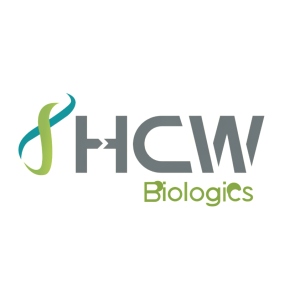HCW Biologics to Showcase its Novel Second-Generation Immune Checkpoint Inhibitor Identified as a Potential Gateway to a Multi-Billion Dollar Market
Rhea-AI Summary
HCW Biologics (NASDAQ: HCWB) has developed a breakthrough second-generation pembrolizumab-based immune checkpoint inhibitor (ICI) using its proprietary TRBC platform technology. The company's novel immunotherapeutic has shown superior performance against solid tumors, particularly pancreatic and ovarian cancer, in preclinical studies.
The new therapy addresses key limitations of current ICIs, which have less than 20% response rates despite generating $40 billion in worldwide sales in 2024. HCWB's enhanced version not only blocks checkpoint receptors but also neutralizes TGF-β and promotes immune cell infiltration into tumors, demonstrating better efficacy than standard pembrolizumab in preclinical trials.
Dr. Hing C. Wong, CEO, will present detailed IND-enabling study results at Nova Southeastern University on September 12, 2025.
Positive
- Novel immunotherapeutic outperformed pembrolizumab in preclinical studies
- Technology addresses current ICIs' low response rate (under 20%)
- Targeting multi-billion dollar market opportunity ($40B in 2024)
- Potential applications extend to age-related diseases as senomorphic drugs
Negative
- Product still in preclinical stage, requiring full clinical trials
- Will face competition from established player Merck's Keytruda
- Efficacy in human trials yet to be demonstrated
News Market Reaction 40 Alerts
On the day this news was published, HCWB gained 112.98%, reflecting a significant positive market reaction. Our momentum scanner triggered 40 alerts that day, indicating elevated trading interest and price volatility. The stock closed at $7.32 on that trading session. This price movement added approximately $8M to the company's valuation, bringing the market cap to $16M at that time. Trading volume was exceptionally heavy at 1639.5x the daily average, suggesting very strong buying interest.
Data tracked by StockTitan Argus on the day of publication.
Company’s pembrolizumab-based immune checkpoint inhibitor exhibited success
against solid tumors in IND-enabling studies by simultaneously activating immune cells and promoting their infiltration into solid tumors
Presentation at Nova Southeastern University
on September 12, 2025, in Fort Lauderdale, Florida
MIRAMAR, Fla., Aug. 25, 2025 (GLOBE NEWSWIRE) -- HCW Biologics Inc. (the “Company” or “HCW Biologics”), (NASDAQ: HCWB), a U.S.-based clinical-stage biopharmaceutical company focused on discovering and developing novel immunotherapies to lengthen healthspan by disrupting the link between inflammation and age-related diseases, announced today that its scientists have successfully developed second-generation, pembrolizumab-based immunotherapeutics against solid tumors, particularly for pancreatic and ovarian cancer, using its novel proprietary TRBC product discovery and development platform technology.
Since their introduction to the treatment of cancer in 2011, immune checkpoint inhibitors (“ICIs”) have been hailed as a breakthrough cancer therapy. Immune checkpoint proteins are expressed on the surface of T cells as the acting regulators for inhibiting the over-activation of T cells. By using ICIs, the immune response of T cells can be largely activated to re-establish the immune effects of anti-tumor exhausted T cells. However, there is vast evidence in preclinical and clinical studies suggesting that the lack of immune-cell costimulatory activities on ICIs diminishes their anti-tumor efficacy.
Dr. Hing C. Wong, Founder and CEO of the Company, stated, “Immune checkpoint inhibitors revolutionized the immunotherapeutic approach against cancer. Unfortunately, it has been reported they only induce an overall response in less than
Pembrolizumab, known as KEYTRUDA® (a registered trademark of Merck Sharp & Dohme LLC), is the leading FDA-approved ICI. HCWB’s TRBC technology enables its scientists to construct pembrolizumab-based fusion molecules that not only have the potential to release the tumor immune surveillance blockade of immune cells by cancer cells and neutralize the most immunosuppressive cytokine, TGF-β, in the tumor microenvironment, but also simultaneously activate immune cells and promote their infiltration into solid tumors. The Company’s pembrolizumab-based fusion molecule has been selected as leading clinical product candidate because in preclinical studies it exhibits potent anti-pancreatic cancer activities and outperform pembrolizumab as monotherapy for cancer both in vitro and in humanized mouse models at dose levels that are well tolerated. This novel fusion immunotherapeutic is designed to block the checkpoint receptors and engages the costimulatory receptors, analogous to taking the foot off the brake and simultaneously hitting the gas, thus, representing a breakthrough second-generation ICI which revives anti-tumor function of T cells.
Dr. Wong continued, “We are very excited to report that our research indicates our proprietary TRBC product discovery platform can be used to create such a second-generation immune checkpoint inhibitor against difficult-to-treat solid tumors. In our preclinical studies, our second-generation checkpoint inhibitor outperformed pembrolizumab in immune-cell activation and expansion, enhancement of immune cell infiltration into the tumors, and immune cell cytotoxicity against cancer cells. Since immune checkpoint inhibitors have also recently been implicated as effective senomorphic drugs for senescent cell removal to treat age-related diseases, we are also intensively exploring this opportunity for the Company’s pembrolizumab-based second-generation immune checkpoint inhibitor.”
Dr. Wong will present the details of IND-enabling studies as an invited speaker for the College of Pharmacy Seminar Series, hosted by Nova Southeastern University, located in Fort Lauderdale, Florida, on September 12, 2025.
Dr. Wong continued, “I am very honored to be invited to present at the College of Pharmacy Seminar Series, organized by Nova Southeastern University, and join a renowned group of medical and research experts who are at the forefront of the treatment of cancer and neurodegenerative diseases. I look forward to sharing the results of our IND-enabling studies with this esteemed group, as well as our findings and the basis for our confidence in the potential of our innovative TRBC technology and its derived second-generation immune checkpoint inhibitor.”
KEYTRUDA® is a registered trademark of Merck Sharp & Dohme LLC, a subsidiary of Merck & Co., Inc. and the company is not affiliated with HCWB.
About HCW Biologics:
HCW Biologics Inc. (NASDAQ: HCWB) is a clinical-stage biopharmaceutical company developing proprietary immunotherapies to treat diseases promoted by chronic inflammation, especially age-related and senescence-associated diseases. The Company’s immunotherapeutics represent a new class of drug that it believes have the potential to fundamentally change the treatment of cancer and many other diseases and conditions that are promoted by chronic inflammation — and in doing so, improve patients’ quality of life and potentially extend longevity. Chronic inflammation, including inflammaging, is believed to be a significant contributing factor to senescence-associated diseases and conditions that diminish healthspan, including many types of cancer, autoimmune diseases, and neurodegenerative diseases, as well as many indications that impact quality-of-life that are not life-threatening. The Company’s lead product candidate, HCW9302, was developed using the Company’s legacy TOBI™ (Tissue factOr-Based fusIon) platform. The Company has created another drug discovery technology, the TRBC platform, which is not based on Tissue Factor. The TRBC platform has the capability to construct immunotherapeutics that not only activate and target immune responses but are also equipped with receptors that specifically target cancerous or infected cells. This platform is a versatile scaffold that enables the creation of multiple classes of immunotherapeutic compounds: Class I: Multi-Functional Immune Cell Stimulators; Class II: Second-Generation Immune Checkpoint Inhibitors; Class III: Multi-Specific Targeting Fusions and Enhanced Immune Cell Engagers. These novel immunotherapeutics can be used to treat a wide range of disease indications, including oncology, autoimmune diseases, and improving quality of life conditions. The Company has constructed over 50 molecules using the TRBC platform, including HCW11-002, HCW11-006, HCW11-018 and HCW11-040. Further preclinical evaluation studies are currently being conducted for these molecules the Company has selected based on promising preclinical data. The Company has two licensing programs in which it has licensed exclusive rights for some of its proprietary molecules. See the Company Pipeline at https://hcwbiologics.com/pipeline/
Forward Looking Statements:
Statements in this press release contain “forward-looking statements” that are subject to substantial risks and uncertainties. These statements are made under the “safe harbor” provisions of the U.S. Private Securities Litigation Reform Act of 1995. Forward-looking statements contained in this press release may be identified by the use of words such as “anticipate,” “expect,” “believe,” “will,” “may,” “should,” “estimate,” “project,” “outlook,” “forecast” or other similar words and include, the potential for a future transaction and sharing proceeds therefrom; the actual success and potency of pembrolizumab-based TRBC fusion molecules; whether pembrolizumab-based TRBC fusion molecules will exhibit potent anti-pancreatic cancer activities and continue to outperform pembrolizumab both in vitro and in humanized mouse models; or whether pembrolizumab-based TRBC fusion molecules are effective in treatment of solid tumors and pancreatic cancers. Further, certain forward-looking statements are based on assumptions as to future events that may not prove to be accurate. Factors that could cause actual results to differ include, but are not limited to, the risks and uncertainties that are described in the section titled “Risk Factors” in the annual report on Form 10-K filed with the United States Securities and Exchange Commission (the “SEC”) on March 28, 2025, the latest Form 10-Q filed with the SEC on August 18, 2025 and in other filings filed from time to time with the SEC.
Company Contact:
Dr. Peter Rhode
Chief Scientific Officer and Vice President of Clinical Operations
HCW Biologics Inc.
PeterRhode@HCWBiologics.com









